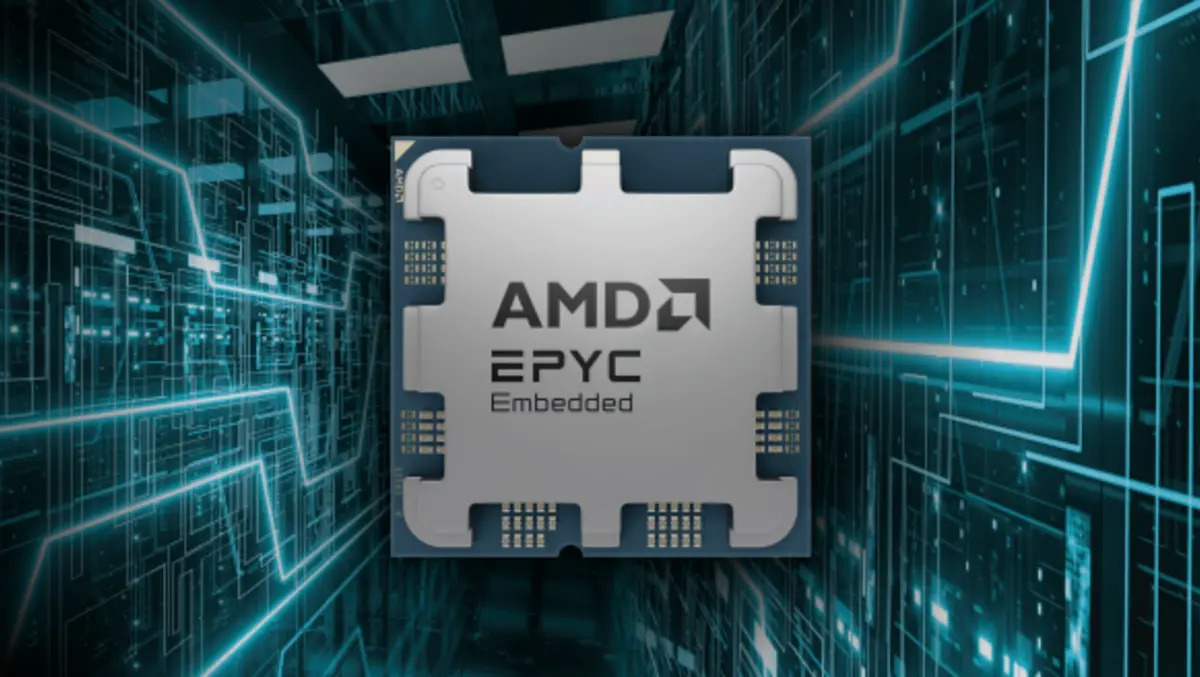AMD has introduced the EPYC Embedded 4005 processor family, adding a new mid-range option to its x86 embedded product portfolio.
The EPYC Embedded 4005 processors utilise the company’s ‘Zen 5’ x86 architecture and are designed for use in networking and security appliances, as well as industrial entry-level servers. According to AMD, these processors feature up to 16 cores, which is twice the number found in competing solutions from Intel. This level of integration is intended to accelerate deployment times while maintaining stability over the long term.
The new processor family is tailored for efficient energy usage, with a configurable thermal design power (TDP) that ranges from 65W to 170W. This allows users to balance workload performance and energy consumption based on specific embedded applications, such as next-generation firewalls or industrial control systems.
Performance focus
AMD reports that the processors offer high clock speeds and up to 128 MB of L3 cache, which are intended to support rapid data management and performance in latency-sensitive scenarios.
The device features high clock speeds and up to 128 MB of L3 cache enable lightning-fast data management, and is performance optimized for latency-sensitive tasks like network packet processing, and industrial real-time control systems. A configurable 65W–170W thermal design power (TDP) range helps balance performance and efficiency for embedded use cases.
Additional capabilities include support for the AVX-512 instruction set, providing a 512-bit data path for AI inference to maximise efficiency and computation performance where such tasks are required.
Design and deployment
With the EPYC Embedded 4005, AMD has also placed emphasis on design simplicity and integration. The processors are compatible with the existing AM5 socket used across other EPYC generations.
AM5 socket compatibility across generations reduces redesign costs and ensures seamless x86 software compatibility that is scalable across the AMD embedded ecosystem to reduce engineering complexity.
This approach is aimed at reducing board design and system development time and costs, while also making it easier for developers to scale and upgrade their solutions in the future. AMD states that this compatibility “ensures ongoing x86 software compatibility for faster time-to-market and easier long-term maintenance.”
Longevity and reliability
Long-term reliability is also highlighted as a feature of the EPYC Embedded 4005 processors. The company offers a planned product lifecycle with seven years of manufacturing and software support. Integrated Reliability, Availability, and Serviceability (RAS) features, such as DRAM ECC, on-chip ECC/parity, and PCIe error detection, intend to maximise uptime and operational stability for applications that require continuous operation.
Embedded solutions must deliver more than raw performance – they must provide longevity, stability, and resilience. EPYC Embedded 4005 series processors offer 7-year manufacturing and software support with embedded RAS features for mission-critical uptime.
According to AMD, this support and the inclusion of robust diagnostic capabilities are required to meet the expectations of customers in embedded and industrial sectors, who often have longer product deployment cycles and higher expectations regarding system availability.
Advanced security and connectivity
The processors are also equipped with connectivity and bandwidth features geared towards demanding edge and industrial applications. Support for DDR5 memory at 5600 MT/s with a 128-bit width alongside sideband ECC is intended to ensure high throughput and data integrity. In addition, 28 PCIe Gen 5 lanes and 11 root ports allow for integration with high-speed networking, storage, and accelerators.
Security considerations are addressed through built-in AMD Infinity Guard features, offering defences against evolving threats and supporting system uptime.
Support for embedded markets
AMD has stated that with the launch of the EPYC Embedded 4005 Series, it is expanding its commitment to embedded markets.
With the launch of the EPYC Embedded 4005 Series, AMD is expanding its commitment to embedded markets. Customers gain a platform that combines leadership performance, robust connectivity, ease of integration, and long-term support – helping them to innovate faster, simplify upgrades, and deploy with confidence.
The EPYC Embedded 4005 family aims to deliver a combination of compute performance, platform longevity, and integration flexibility for organisations building edge or industrial solutions. Seven years of manufacturing commitment and software support are being offered as part of the package, reflecting the needs of sectors that require consistent long-term product availability and support.

